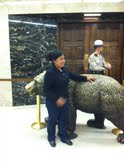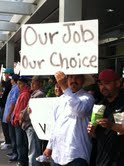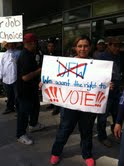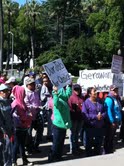Roll over, Cesar Chavez, here comes Silvia Lopez.
Silvia Lopez is a quiet, thoughtful 15-year Gerawan Farming employee, and the de facto leader of thousands of Central Valley farm workers who have been protesting for nearly a year to oust the United Farm Workers union from the farming company.
Seven hundred Gerawan farm workers took a day off without pay and descended on Sacramento Wednesday to attend a meeting at the Agricultural Labor Relations Board. Then they walked to the State Capitol to meet Gov. Jerry Brown.
Six of the farm workers tried to ask Brown to intervene with the ALRB to allow them to vote on whether to keep or oust the UFW from Gerawan Farming.
“Jerry Brown, we want an election at Gerawan Farming,” Lopez said, as she approached the governor’s office.
While waiting in the Capitol hallway outside, one of Brown’s employees poked her head out and asked, “Are you guys with the UFW?”
“No, we are against the UFW,” Lopez said. “We are farm workers with Gerawan Farming. And I am Silvia Lopez.”
But the governor didn’t respond. Instead, to talk with the workers, he sent Martha Guzman-Aceves, the Deputy Legislative Secretary for agriculture, environment and natural resources.
From Guzman-Aceves, Brown’s negative message was loud and clear. She is a former Legislative Coordinator for the United Farm Workers, AFL-CIO. She was co-founder of three non-profit organizations under the name, the Communities for a New California. It describes itself as “committed to empowering underrepresented communities in California’s Central Coast, San Joaquin Valley and South East Desert. CNC works to promote economic prosperity, community health, and accessible and accountable government with election and policy campaigns. CNC organizes communities around the issues that matter most to them through localized direct education activities, earned media, and training.”
Meeting
The meeting with Guzman-Aceves lasted 45 minutes, during which Lopez told the story reiterating that the workers don’t want and don’t need the UFW at Gerawan Farming. She told Guzman-Aceves how she personally collected 90 percent of the workers’ signatures, but they were rejected by the ALRB.
The workers recounted the UFW harassment, and showed Guzman-Aceves Lopez’s swollen wrist.
Guzman-Aceves said she would call the ALRB area representative in Visalia. But Lopez said that would do nothing, as ALRB’s Visalia regional director, Silas M. Shawver, is the official who rejected the signatures, and has fought them every step of the way.
“Would you not like me to call him?” Guzman-Aceves asked.
Lopez explained again that they were there seeking intervention from the governor. “There’s no recourse for us. That’s why we are here,” she said. “We just want an election.”
But as Guzman-Aceves stood up to indicate the end of the meeting, Silvia Lopez shook her head and said, “Jerry Brown is not coming.”
UFW response
“The ALRB issued a 12-page report which dismissed the workers’ petition,” said UFW communications director, Maria Machuca, when I called her. ”It was just a small group, the petition, and included forgeries and company involvement, which is illegal.”
“The ALRB invalidated the Gerawan decertification petition based on illegal employer involvement,” Machuca added in an email following my call. “In its review of the petitions signed by employees, the ALRB found a substantial number of forged signatures. Nothing demonstrates more disrespect for employees than forging their signatures on a legal document.”
The ALRB decision Machuca referred to was issued Sept. 25. “This Petition is invalid because is has not been accompanied by an adequate showing of interest,” the decision said. “In addition, the Petition is being dismissed because there is no reasonable cause to find the Petition presents a genuine question of representation.”
Ironically, because the workers were not represented by a union, they could not petition to get rid of the union.
Coming to Sacramento
Earler in the day, Lopez led 700 polite workers holding signs that said, “No UFW,” “Our Jobs, Our Choice,” and “Let us Vote.”
Despite the calm crowd, Lopez pointed out UFW infiltrators. Lopez told me she had an encounter with a couple of UFW representatives as the group’s seven buses arrived and parked on 10th Street in front of the Capitol. One of the UFW men grabbed and twisted her wrist and demanded to know who paid for the buses.
Lopez said the UFW men then tried to get the bus drivers to tell them who paid for the buses. Getting nowhere, they called some of the workers — excuse the word, but it’s important to quote it directly — “wetbacks,” and threatened to call immigration law enforcement.
Despite the aggression, Lopez welcomed the men to join her should they change their minds about the UFW.
As to the buses, Lopez told me that they were paid for by a generous donor after he heard her interview on the Ray Appleton radio talk show Tuesday. The buses carried the 700 protesters from the Fresno area to Sacramento.
Agricultural Labor Relations Board
The hundreds of farm workers assembled in front of the Sacramento Convention Center on J Street while Lopez and others met with a representative from the ALRB, located across the street. Lopez said they would not let her into the ALRB board meeting in progress, and instead had her communicate through an ALRB employee.
“The UFW is not offering anything,” Lopez said. “The ALRB is the same — they are just up there,” she said, gesturing 20-story building across the street (pictured nearby).
Lopez was only asking for the opportunity to vote on whether the Gerawan employees would allow the UFW to represent them, or not. The ALRB has denied this request, despite the 3,000 signatures Lopez collected for a petition to decertify the union and allow them to continue working as non-union employees.
UFW and ALRB
In order to breathe new life into the moribund union, many in the farming community claim the ALRB and UFW have joined forces to boost the union by targeting one of the biggest non-union farming operations in the state. Should they succeed in unionizing Gerawan Farming employees, adding the 5,000 farmworkers would double union membership, and certainly boost the ALRB’s status.
The UFW is a shadow of what it once was. With approximately only 3,300 union members, the UFW needs money and members to survive. Earlier in the year, I wrote about Senate Bill 25, a bill by Sen. President Pro Tem Darrell Steinberg, D-Sacramento, targeting six of the largest non-union farming operations in the state.
Gerawan Farming’s story depicts a state government seeking to encroach on private sector business. Owner Dan Gerawan told me in August, if SB25 was signed into law, he could lose his business and thousands of his workers could lose their jobs.
He said the real motive behind SB25 was to target his 5,000 workers, as well as other large farming companies’ workers, to force them into the UFW in order to immediately double the union’s size. SB25 was not passed this year, but will be taken up next year.
Gerawan Farming
The UFW won an election to represent Gerawan Farming’s workers 23 years ago. But after only one bargaining session, the union disappeared and wasn’t heard from for more than 20 years.
Last October, the union reappeared to impose a contract on Gerawan Farming and its employees — without a new vote of the workers.
Every Gerawan worker said the company offers the highest paying employment package in the industry; the workers don’t need or want the union.
Belen Lopez, Silvia’s daughter, said she goes to college and was working as a cashier for $8.00 per hour. But she quit that job and went to work in quality control at Gerawan Farming, starting at $10.00. Belen said Gerawan pays bonuses and allows her a flexibility to meet her school schedule. She and the other workers said Gerawan Farming allows all the time off they need, and allows the workers to decide among themselves who works, as long as the production needs are met.
The right to vote
“Government, we are here of our own free will,” yelled one farm worker as he stood in front of the ALRB building, looking up to the 19th floor. “We are here and we want the right to vote!”
“We don’t want the union — we want the right to vote. We want to be heard!” Silvia Lopez yelled into the microphone.
Lopez said she personally gathered more than 1,100 workers’ signatures in only three days. And it’s not an easy task. Signature gatherers must wait until workers are on break to even approach them, and use the time to explain the petition and get signatures. She eventually gathered more than 2,800 signatures, but the ALRB denied most of them, claiming the signatures were forged, as I wrote in “Farm workers fight UFW unionization.”






